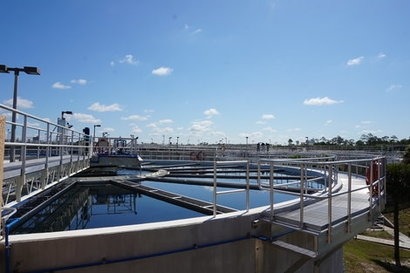
Anaerobic bacteria can convert organic material in used water sludge into biogas which can then be used to generate electricity. The co-generation demonstration facility, located at the Ulu Pandan Water Reclamation Plant (WRP) will be able to treat up to 40 tons of combined food waste and water sludge. The food waste will be collected from the Clementi district, enabling the plant to produce more biogas because of the higher calorific value of the waste. The plant will utilise the Omnivore process patented by Anaergia, which makes use of anaerobic digestion.
Singapore’s National Environment Agency (NEA) will be conducting a district level pilot in Clementi for the collection of source-segregated food waste from various premises – such as educational institutions, hospitals and camps – for co-digestion at the demonstration plant. The demonstration plant is currently under construction and will be completed by September 2015.
“This demonstration plant aims to validate the efficacy and cost-effectiveness of co-digestion implementation in Singapore” said Harry Seah, Chief Technology Officer, PUB. “It will provide the opportunity for the water reclamation plants to generate more electricity for process usage. This could potentially allow the used water treatment plant to achieve energy self-sufficiency, which is using only as much energy as the treatment process itself generates.”
Andrew Benedek, Anaergia’s Chairman and Chief Executive Officer, added that there is no better place than Singapore nor a better utility than PUB to work with to demonstrate Anaergia’s groundbreaking technologies designed to make water reclamation plants energy neutral.
If successful, the process could potentially be implemented at the Tuas Water Reclamation Plant, which is to be developed in the near future, and NEA’s Integrated Waste Management Facility. The collaboration between the water agency and Anaergia is a result of a Memorandum of Undestanding (MOU) signed during Singapore International Water Week (SIWW) in 2014 in which both companies agreed to explore potential research and technological collaboration, particularly in the domain of waste-to-energy.
The project was supported by a co-funding grant from the Technology Pioneer (TechPioneer) Scheme administered by the Singapore Economic Development Board (EDB) on behalf of the Environment and Water Industry Programme Office (EWI). This scheme encourages water companies to tap on Singapore as a Living Laboratory so that cutting edge technology can be testbedded and commercialised in an actual operating environment. A total of 150 projects involving the testbedding of water solutions have been facilitated at PUB’s installations, and more than 20 test-bedding projects are currently on-going at PUB’s facilities.
For additional information:

